Martin Edwards's Blog, page 50
November 14, 2022
Grand-Guignolesque by Richard J. Hand and Michael Wilson - review
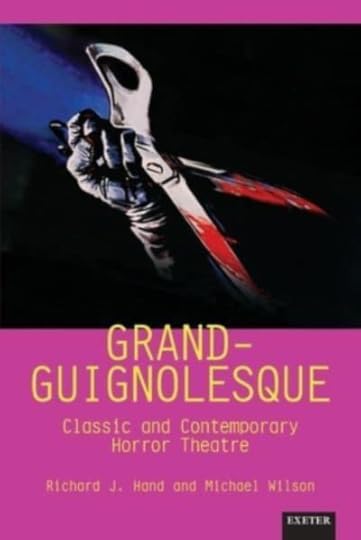
We often use the term 'Grand-Guignol' without thinking too much about the Parisian 'horror theatre' which gave rise to the term. This new book, published by the University of Exeter Press, is written by two academics with an abiding interest in horror and also cross-media forms of popular culture. Richard Hand is an expert in film and performance, while Mike Wilson, with whom I've had many interesting conversations over the years, is also deeply interested in crime writing, especially that written for the stage.
Their book is subtitled Classic and Contemporary Horror Theatre and it's a very interesting read. One of the things I like about it is the absence of the verbosity that sometimes ruins academic writing; Hand and Wilson write snappily and makes their points clearly, a big plus. They discuss, among others, F.Tennyson Jesse, a writer who has long intrigued me, and they refer to her play The Mask, which I haven't read, but would like to.
There is also discussion of writers such as Joseph Conrad and Agatha Christie, whom one wouldn't immediately associate with Grand-Guignol, and reference to Christie's Rule of Three, which I hope to write about myself before long. Mention is also made of John Dickson Carr, who was clearly influenced by the atmospherics of Grand-Guignol. But there's also some very interesting discussion of recent writing in the Grand-Guignol style.
The bulk of the book is devoted to reprinting a wide range of plays in the Grand-Guignol vein. One of them is The Lover of Death by the French writer Maurice Renard; I agree with the authors that his work deserves to be better-known in the UK. In The Life of Crime, I mention an extraordinary novel which he co-wrote, Blind Circle, a strange mix of mystery and the macabre.
The other plays include a fairly recent adaptation by Eddie Muller of a play from the mid-fifties, Orgy in the Lighthouse, the ending of which is - even by the most jaded standards - truly horrifying. There is something about lighthouses and their lonely yet claustrophobic interiors that inspires remarkable stories. All in all, a very interesting book - I learned a good deal from it.
November 11, 2022
Forgotten Book - Suddenly at His Residence
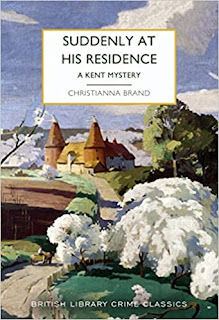
Recently I attended a meeting with colleagues from the Publications Department at the British Library. We were discussing forthcoming titles in the British Library Crime Classics series as well as other projects, and I was delighted to learn that the books - both the novels and the anthologies - are selling as well as ever. I also had the pleasure of meeting the team member responsible for selling translation rights and it seems that the books are doing increasingly well in different parts of the world. So all the signs are that the series will flourish for a considerable time to come. The main challenge is choosing which books - among the hundreds of worthwhile possibilities - to include so as to maintain and enhance the series' reputation for variety and quality.
I'm the consultant to the series, but of course I'm not the decision-taker and the ultimate responsibility for negotiating on rights and so on rests with others - thankfully! But it's pretty clear that a series like this succeeds by combining popular favourites (albeit relatively recently discovered ones in some cases, E.C.R. Lorac being a good example) with stories that are unknown even to many long-term fans of classic crime (such as Billie Houston's Twice Round the Clock). Among the writers who has made a strong impression on returning to print is Christianna Brand and another of her titles, Suddenly at His Residence (aka The Crooked Wreath) will feature in the series next summer. The Library has given it a new sub-title: A Kent Mystery.
This book makes ingenious use of several tropes of Golden Age fiction. So we have a family tree, a cast of characters and a note indicating that the cast includes two victims and a murderer. There are multiple solutions and not one but two impossible crimes. There's also a final reveal right at the end of the story. Oh, and a rather likeable Great Detective in Inspector Cockrill.
One of Brand's greatest strengths as a crime writer was her commitment to playing fair with her reader. So the clues are supplied, but she disguises them so craftily that it's far from easy to figure out exactly what is going on before Cockrill reveals all. This is a novel published after the Second World War, but it's set in wartime and that background reality makes an important contribution to the storyline. All in all, a pleasing mystery and I'm delighted that it will, before too long, become available again to a very wide readership.
November 9, 2022
'Darling Lorraine', Paranoia Blues, and The Adventures of the Puzzle Club
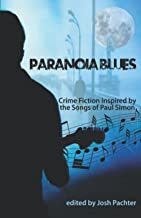
I first became aware of Josh Pachter back in the early 80s, when I came across his anthology Top Crime. I learned that, in addition to being a meticulous anthologist, he is a short story writer of considerable accomplishment. Many years later, I met Josh and his wife Laurie and discovered that they are terrific companions - one of the downsides of the pandemic is that I've not been able to meet up with them in person for several years.
But we remain in regular contact. Josh was a great help when I was working on the anthology Foreign Bodies and some time ago I had the chance to contribute to a new anthology that Josh was putting together. The connecting theme was that each story would be inspired by a Paul Simon song, though only one song per album could be chosen. I've been a huge Paul Simon fan since my teens. He's a great performer, and a quite wonderful songwriter (and did you know that he once did demo records for Burt Bacharach? Timeless classics such as 'Gotta Get a Girl', later recorded by Frankie Avalon? Suffice to say that both Paul and Burt went on to do much better work!)
To cut a long story short, I finished up writing a story called 'Darling Lorraine'. The inspiration came from a fascinating visit to the house of a crime writing friend. The building is unique and very appealing and the grounds and local setting are just as intriguing. I felt they would make a terrific setting for a story and the Paul Simon spark was all I needed to come up with a plot.
And now the anthology has just been published. It's called Paranoia Blues and although I haven't received my copy yet, I'm really looking forward to seeing the other stories, penned by writers ranging from Edwin Hill and Gabriel Valjan to Tom Mead. And as if that were not enough, Josh has also got a new book out via Crippen & Landru. The Adventures of the Puzzle Club combines original snappy mysteries by Ellery Queen and new ones in the same manner by Josh himself. I've made a tiny contribution to the book, but the stories are the thing, and they are great fun.
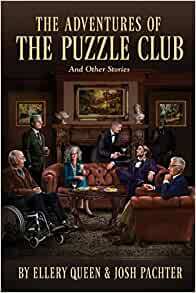
November 8, 2022
Crossfire - 1947 film review
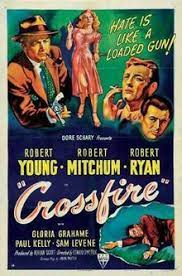
Crossfire is an intriguing film noir with an ambitious and interesting theme. It received five Oscar nominations and, three-quarters of a century on, it remains very watchable indeed. The three male stars are all called Robert; each gives a highly distinctive and impressive performance. They are Robert Young, as a smart but low-key cop called Finlay, Robert Ryan, as a seemingly amiable but in truth sociopathic soldier, and Robert Mitchum.The director was Edward Dymtryk and the screenplay by John Paxton.
From the start, we're aware that two men have beaten up a Jewish man, Samuels, and killed him. Finlay and his team soon discover that Samuels had been in the company of a group of soldiers prior to his death and it's likely that one of them (at least) is responsible for the murder. Suspicion falls on a soldier called Mitch, but it emerges, partly through flashbacks, that the killer was Ryan's character, Monty, and that his accomplice was a soldier called Floyd.
There's no clear evidence to link Monty to the crime, but his temper and brutality mean that he is a dangerous man to know. Finlay deduces his motive and sets about laying a trap...
I don't think it's much of a spoiler to say that antisemitism is the motive for the crime. It's also an element in The Brick Foxhole, the book on which Paxton based his script. But in the novel, homophobia is a central issue. The movie industry in 1947 simply wasn't ready to tackle that. Nevertheless, the film delivers a very forceful message about bigotry of all kinds, as well as antisemitism in particular. The Brick Foxhole, incidentally, was an early novel written by Richard Brooks, who became a noted film director, working on movies such as Blackboard Jungle and In Cold Blood.
November 4, 2022
Forgotten Book - Don't Whistle 'Macbeth'
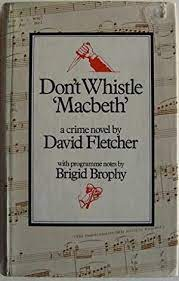
David Fletcher is an author I enjoy reading. His real name was Dulan Barber, and he was quite a prolific and versatile novelist who produced a dozen crime novels as Fletcher. He died young, of a heart attack, when he was only 48 and I think this accounts in part for the neglect into which his work has fallen. He was a talented exponent of psychological suspense.
Don't Whistle 'Macbeth', published in 1976, is rather different from the other Fletchers that I've read. It's an interesting attempt to blend a whodunit plot with an operatic background and a sort of belated 'coming of age' story involving the narrator, David Kingsley-Grieff. A gimmick is the inclusion of 'programme notes' by Brigid Brophy, who in those days was a high profile figure in the literary world. The setting is a posh country estate which is home to a recently revived opera festival, which is about to stage Don Giovanni.
The author was an opera lover, and the background is very well-realised. The festival is put on by a rich but troublesome chap called Hugo, who has a failing marriage to Leonie and a beautiful but wayward daughter, Petronella, from a previous relationship. David has taken an admin job at the festival mainly because he is infatuated with one of the performers, a woman called Dorcas. But then murder occurs and David becomes not only a suspect but also a potential victim.
The story is capably written and the plot is quite sound, even if one or two pieces of behaviour aren't in keeping with the realistic tone of the narrative. David, I fear, is a rather irritating character. Even the dust jacket blurb acknowledges that he is priggish. So I didn't care quite as much as I should have done about his tangled love life and his attempts to solve the puzzle. I also found the explanation for the mysterious whistling of the title to be rather an anti-climax. Even so, it's a book that's worth reading and Fletcher certainly deserves not to be forgotten.
November 2, 2022
The Circle - 2017 film review
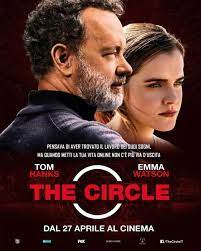
The Circle is a techno-thriller released four years ago. As I understand it, the movie was a commercial hit but didn't particularly please the critics, perhaps because they regarded it as somewhat unoriginal. However, I enjoyed the story and thought that its treatment of issues concerning personal privacy in the modern age was pretty sound, even if not as sophisticated as that of a much older film, The Conversation, which is a genuine masterpiece.
The Circle benefits from a good cast, led by Emma Watson, who plays Mae Holland. Mae's friend Annie (Karen Gillan) helps her to get a job with The Circle, a highly sophisticated social media company with more than a touch of Facebook and Youtube about it. Mae's father suffers from MS, and her parents are glad that she's got a chance of career progression, but her old friend Mercer, with whom she used to go kayaking, is less impressed.
Soon Mae comes to attention of the company's CEO Eamon Bailey. Bailey is played by Tom Hanks, whose charm makes this a very good piece of casting indeed. Bailey waxes lyrical about the benefits of accountability and transparency, especially in terms of cleaning up politics, and soon Mae is spearheading the campaign to make The Circle omnipresent in everyone's lives. But transparency comes at a cost...
I don't claim that The Circle digs really dip, either into character or the politics of privacy, but I do think that the script makes a number of good points without interfering too much with the telling of a decent story. One poignant aspect of the film is that it marked the final appearance of both the actors who play Mae's parents, Bill Paxton and Glenne Headly, both of whom gave effective performances.
October 31, 2022
Ghosts and Ghosts from the Library
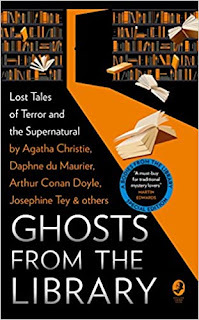
On Halloween, what better than to look at a couple of enjoyable - and very different - anthologies of ghost stories? I've always been interested in stories of the supernatural, and with a few notable exceptions I think the ghost story usually works best in the short form. I've even tried my hand at this kind of fiction, with a story called 'No Flowers' that appeared in Ellery Queen's Mystery Magazine (and the editor Janet Hutchings even recorded me reading it a few years ago), and I may return to it before too long.
Ghosts from the Library is the latest collection edited by Tony Medawar. It's a companion volume to his Bodies from the Library series, and Tony kindly inscribed the books for me recently, when I was his guest at a fascinating crime-themed dinner in London. It's no secret that Tony and I are old friends, so naturally you'd expect me to like his books, and this latest title definitely reflects his reputation as the best in the business at finding unknown stories by leading authors of the past.
One astonishing find also happened to be my favourite story in the whole book. This is 'The Green Dress' by Anthony Berkeley. I never knew it existed, but I really enjoyed reading it - for me, that story alone justifies the book! But there's plenty more beside, including a good story by Christianna Brand, another by Edmund Crispin, and an excellent Agatha Christie that I'd previously heard in an audio version.

Louise Welsh is someone I've never met, but I've admired her writing for a long time. Ghost is a massive anthology (with lovely cover artwork by the admirable Ed Bettison) which includes no fewer than one hundred stories, with contributions from Pliny the Younger to Fay Weldon. With so many good things included, it's impossible to pick out favourites, but I must say that I was impressed that Louise Welsh managed to find so many gems that I'd never come across before, rather than sticking to a predictable line-up. So just to whet your appetite, the author list includes Kafka, Richmal Crompton, Tove Jansson, P.G. Wodehouse, Sir Alec Guinness, Kazuo Ishiguro, and Hilary Mantel. Not to mention two of the finest short story writers of all, Shirley Jackson and William Trevor. A terrific book.
October 28, 2022
Forgotten Book - Death of an Author
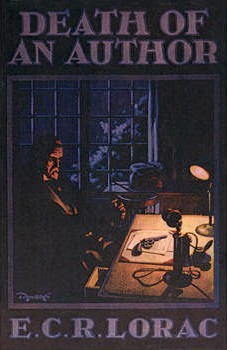
The revival of E.C.R. Lorac's reputation as a detective novelist during the past few years has given me a great deal of pleasure. As I've said in the past, I was introduced to her work by my parents, and I often think that they'd be amused and gratified to see that a writer they both enjoyed has found an extensive new readership in the twenty-first century, not only in the UK but also in the US.
Death of an Author was one of her early books, written before she moved up to Lunesdale. It was the last novel of hers published by Sampson Low before she was taken on by Collins Crime Club. An unusual feature of the novel is that Inspector Macdonald doesn't appear. Here she introduces us to a likeable pair of cops called Warner and Bond.
The early chapters are absolutely excellent. We meet a publisher called Marriott and one of his top authors, a man called Ashe. The conversation turns to a bestseller by a mysterious author called Vivian Lestrange. Ashe is fascinated by book and author and persuades Marriott to arrange a dinner at which he can meet the reclusive writer. But then he is thunderstruck to be introduced to an attractive young woman...
It's difficult to discuss this book without giving too many spoilers. Suffice to say that we are given a fascinating picture of the literary world as well as an intriguing and unorthodox mystery. I really enjoyed it and I'm pleased to say that the British Library are also keen. This is a book that is extremely rare, but it won't be for long. Next year, all being well, it will appear as a Crime Classic.
October 26, 2022
Last Looks - 2022 film review

Last Looks is a recent entry in that challenging and often underwhelming branch of film-making, the 'comedy thriller'. Striking the right balance between comedy and thrills is a far from straightforward task. However, Tim Kirkby's film, based on a novel by Howard Michael Gould, makes a good attempt at mixing the ingredients in the correct measures.
At the start of the film, we're introduced to Charlie Waldo (played by Charlie Hunnam), who has quit the LAPD for a simple life in a trailer; he has just one hundred possessions. A glamorous old flame called Lorena (Morena Baccarin) tries to encourage him to put his detective talents to work on behalf of a famous actor, Alastair Pinch, who has been accused of murdering his wife. Waldo plays hard to get, but after Lorena disappears he finds himself drawn into the mystery. And we find out that his new home is only a bike raid away from the city....
Pinch is played by Mel Gibson, who is entertainingly awful as an entitled British actor whose main redeeming feature is his devotion to his small daughter. There are quite a lot of amusing parodic touches, including the hero's obligatory fling with a pretty blonde woman, but the script is good enough to ensure that the audience doesn't become bored or irritated. The mystery plot, despite leaning heavily on tropes of the private eye genre, is soundly constructed.
I don't recall coming across Charlie Hunnam before, but he holds the film together with a performance of considerable range and humanity. A story of this kind can easily lose momentum after a few initial surprises and jokes, but Last Looks kept me interested to the end. Very good light entertainment.
October 24, 2022
Natural Enemy - 1996 film review
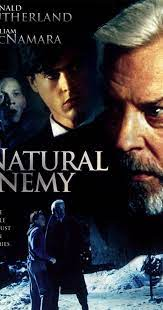
Natural Enemy is a thriller starring Donald Sutherland which dates back twenty-five years. I knew nothing about the film, but Sutherland is always good value, and so I gave it a go. I was glad I did, since it's entertaining story that doesn't outstay its welcome. After watching, I discovered that it's a Canadian made for TV film, but it is of a higher standard than many made-for-telly movies, despite the fact that Kevin Bernhardt's script does have a few shortcomings.
We're thrown into the action right away. Ted (Sutherland) is a financial trader who has a good-looking young right-hand man called Jeremy (William McNamara). From the start it seems that Jeremy is slightly strange and over-the-top and it soon emerges that he has violent tendencies. Ted unwisely invites the young man to stay at his family home while he sorts out a few problems in his personal life. At first Jeremy demurs, but he changes his mind, and turns up with a girlfriend in tow: she is older, and married to someone else.
Ted lives with his glamorous second wife Sandy (Lesley Ann Warren) and his son from his first marriage, Chris (Christian Tessier). Sandy is pregnant, and the family is a happy one. However, Jeremy soon proves to be a disruptive influence and his behaviour towards his girlfriend is sadistic. It's pretty evident that there is something very wrong with him, and Ted's extreme naivete where Jeremy is concerned is one of the flaws in the story.
Nonetheless, as events spiral towards a terrible climax, the cast handle the material with plenty of verve. It's easy to dismiss films such as this as hokum, but the quality of the acting, in particular from Sutherland and Warren, and the pace of the story meant that I was happy to suspend my disbelief.



